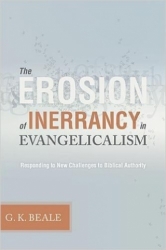A Brief Book Summary from Books At a Glance
About the Author
G. K. Beale is professor of New Testament and Biblical Theology at Westminster Theological Seminary. In recent years he has served as President and as a member of the executive committee of the Evangelical Theological Society. (At the publication of this book, the author was Kenneth T. Wessner Chair of Biblical Studies and Professor of New Testament at Wheaton College Graduate School.)
Overview
G. K. Beale addresses contemporary challenges, intentional or not, to the doctrines of biblical inerrancy and authority. Whereas the old battles arose between liberals and fundamentalists, we now must consider arguments from within evangelicalism.
Table of Contents
Introduction
1. Is a Traditional Evangelical View of Scripture’s Authority Compatible with Recent Developments in Old Testament Studies? Part 1
2. Is a Traditional Evangelical View of Scripture’s Authority Compatible with Recent Developments in Old Testament Studies? Part 2
3. Is a Traditional Evangelical View of Scripture’s Authority Compatible with Recent Developments in the Study of the Old Testament in the New? Part 1
4. Is a Traditional Evangelical View of Scripture’s Authority Compatible with Recent Developments in the Study of the Old Testament in the New? Part 2
5. A Specific Problem Confronting the Authority of the Bible: Should the New Testament’s Claim That the Prophet Isaiah Wrote the Whole Book of Isaiah Be Taken at Face Value?
6. Can Old Testament Cosmology Be Reconciled with Modern Scientific Cosmology? Part 1
7. Can Old Testament Cosmology Be Reconciled with Modern Scientific Cosmology? Part 2
Conclusion
Appendix 1: Postmodern Questions of Authorial Intent, Epistemology, and Presuppositions and Their Bearing on the Authority of the Old Testament in the New
Addendum to Appendix 1: Brief Reflection on the Relationship of Globalism to Postmodernism
Appendix 2: Chicago Statement on Biblical Inerrancy with Exposition
Appendix 3: Selected Quotations from Karl Barth’s Church Dogmatics on the Fallible and Errant Nature of Scripture
Summary
Introduction & Overview
G. K. Beale begins his discussion of inerrancy by conjuring a typical conversation between biblical scholars. One is a traditionalist and one is a progressive evangelical. They do not see eye to eye. Progressive Pat urges Traditionalist Tom to recognize the changing face of evangelical institutions, the way many are now viewing biblical authority in a more flexible way. He also points out that the genre and composition of Scripture are coming into view more clearly: the Bible is not a philosophical or scientific textbook – it is a story. Furthermore, books like Isaiah are not to be read as grand future-telling exercises. Isaiah, for instance, is a composition of several works each oriented toward events contemporary to its author and audience. Postmodernism has taught us “that we moderns have different presuppositional perspectives from one another,” different still from ancient writers.
Traditionalist Tom puzzles over the changing definition of “evangelical.” Whatever Pat’s views are, they do not seem to conform to something like the 1978 Chicago Statement on Biblical Inerrancy. While it is good to see the Bible as confronting its hearers with God’s presence, it also must be said that the text makes claims about history in connection to that overarching redemptive-historical story. Many things change from generation to generation, but the concepts of truth and error have some connection across time. On the topic of Isaiah: didn’t Jesus assume (much later) that Isaiah wrote the book that bears his name?
From there, the conversation could go on for quite a while. This mock dialogue is representative of the impasse that has long existed between biblical scholars in general, but it is notable that this is now occurring between professed evangelicals. Here we explore one such dialogue in the first half of the book: Peter Enns, former professor at Westminster Theological Seminary (in his twelfth year at the school when his controversial book, Inspiration and Incarnation, was published) and Greg Beale exchanged comments publicly on the changing landscape in biblical scholarship. The author’s comments and summaries of Enns’ remarks are duplicated here. In the second half of the book, we take up specific topics in biblical studies related to Isaiah and modern science.
Chapter One
Is a Traditional Evangelical View of Scripture’s Authority Compatible with Recent Developments in Old Testament Studies? Part 1
We begin with the first review, “Myth, History, and Inspiration: A Review Article of Inspiration and Incarnation by Peter Enns,” published in the Journal of the Evangelical Theological Society (JETS) in 2006.
In Inspiration and Incarnation, Enns has presented a view of inspiration and hermeneutics (the science of interpretation) not traditionally held by evangelical scholarship. He does this by relating the Old Testament to ancient Near Eastern myths: Old Testament writers used the then-common genre of myth to communicate God’s truth. Furthermore, Enns argues, this form of writing theological stories leads to perceptible theological diversity among Old Testament authors.
[To continue reading this summary, please see below....]The remainder of this article is premium content. Become a member to continue reading.
Already have an account? Sign In
